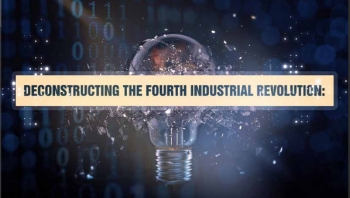Deconstructing the fourth industrial revolution
Over the last few years, the phrase ‘Fourth Industrial Revolution’ has been appearing in many contexts as a signifier of technological disruption, but what does this mean? In his presentation, Dr Michael Gastrow emphasised the need to define the concept for the South African context as well as for the development of a research agenda that speaks to issues of technological change and disruption in South Africa.
The idea that we are in a Fourth Industrial Revolution (4IR) is premised on the observation that technological change is accelerating, that technologies are converging, and because of the velocity, scope and impact of these changes we have entered a new technological era. The term was first used in 2016 by the World Economic Forum (WEF) executive chairman, Prof. Klaus Schwab. According to Schwab, the first industrial revolution used steam power to mechanise production, the second used electric power to create mass production, and the third used electronics and information technology to automate production. The 4IR is building on the latter.
A defining feature of the 4IR concept is that of a ‘blurring of the boundaries’ of physical, biological, and digital systems. There are many examples of this, from the use of virtual reality and online avatars to the use of sensors and robotics in advanced prosthetics. This posthumanist discourse argues that humans are evolving beyond our biological origins, and that personhood increasingly encompasses biological, physical and cybernetic systems.
The WEF argues for the importance of cultivating intellectual and policy responses to this new era. This call has captured the attention of institutions around the world, perhaps by providing a conceptual hook upon which individuals and institutions can hang the many issues that are emerging from the rapid technological changes happening around us. In South Africa, institutions are responding to the 4IR through multiple, parallel and sometimes interlinked processes. These include structured policy-and strategy-development processes within parliament, the government, higher education institutions, the private sector and research institutes.
The 4IR and social sciences
Social scientists need to ask why there is such a sudden interest in the 4IR. Academics have been studying innovation and its impact for a long time. What has changed? How does the concept of the 4IR differ from other ways of understanding technological change?
Innovation systems analysis is the main discipline and conceptual foundation for South African and global science and technology policy. Mainstream innovation studies have a wider focus than the 4IR. They include the study of incremental innovation that doesn’t have world-changing consequences yet is nonetheless critical for specific groups. The 4IR approach, on the other hand, focuses on the disruptive elements of technological change.
Innovation systems analysis is, in effect, the study of evolutionary economics. Unlike innovation systems analysis, the 4IR concept is not embedded in a body of disciplinary research. It can be read as an ideological statement of the WEF, generated by a discourse that draws on both academic research and non-academic ideas in a loosely structured rhetorical argument.
Within this, the 4IR approach draws significantly on the language of ‘future studies’. Future studies is infused with the language of Silicon Valley, with its interest in being exponential, and in tipping points and megatrends. Mainstream economists and innovation specialists have a hard time predicting the future – predictions are always likely to be wrong. However, future studies is now becoming mainstreamed, and for good reason. The more rapidly technology advances, the more important it becomes to get a handle on where it is going.
A research agenda
Social scientists are increasingly having to confront a dynamic language of technological change and future orientation. Policy makers, institutions, and the broader public are seeing whole industries and sectors and social practices change before their eyes, creating demand for explanations and solutions.
Social science and humanities have important roles to play in responding to these imperatives. The term ‘4IR’ is appearing in many contexts as a marker or signifier of technological disruption. However, we need to ask whether this term has a coherent and consistent meaning. Is the notion of an iterative sequence of industrial revolutions supported by the economic history literature?
Are the associated changes really about industry? Are the changes better conceived of as revolution or evolution? The concept of 4IR has emerged from developed economies. We therefore need to develop a home- grown South African response to technological change and disruption. This includes changes to the production of goods and services, what it means to be human, and changes to global power structures. Industrial automation means that machines increasingly compete with humans in labour markets. We need to establish economic and innovation systems intelligence related to disruptive technologies, including affected sectors, value chains and city regions. Humans are undergoing multiple changes, such as increased longevity, augmentation of human bodies and minds, genetic modification, the changing nature of work learning, human connectivity, and identities.
New technologies are important to the future of power. For example, artificial intelligence is being used by geopolitical actors to gain power in the military, intelligence, economic and public arenas. At the same time, rogue artificial intelligence might present global existential risks.
The role of the HSRC
The HSRC’s position in the research-policy nexus, its research capabilities, and its public mandate all point towards a responsibility to engage with issues of technological disruption. It is therefore developing an institutional response to the 4IR, including a position statement, co-ordination with internal and external stakeholders, and capacity development. The overall objective is to develop a research agenda that will cultivate an empirical understanding of opportunities and threats, to inform appropriate policy responses.
Contact: Dr Michael Gastrow, a research specialist in the HSRC’s Education and Skills Development research programme
mgastrow@hsrc.ac.za

